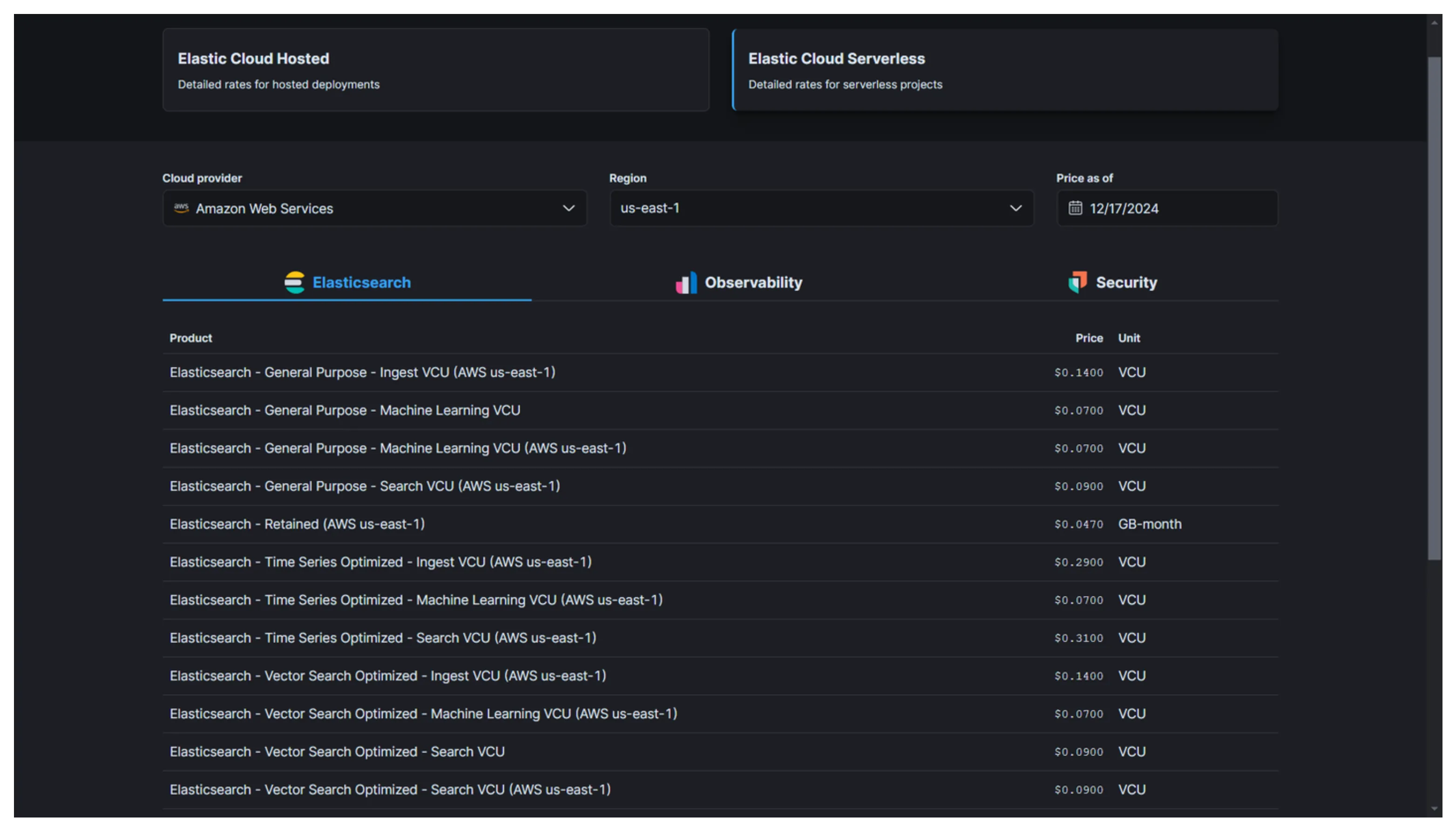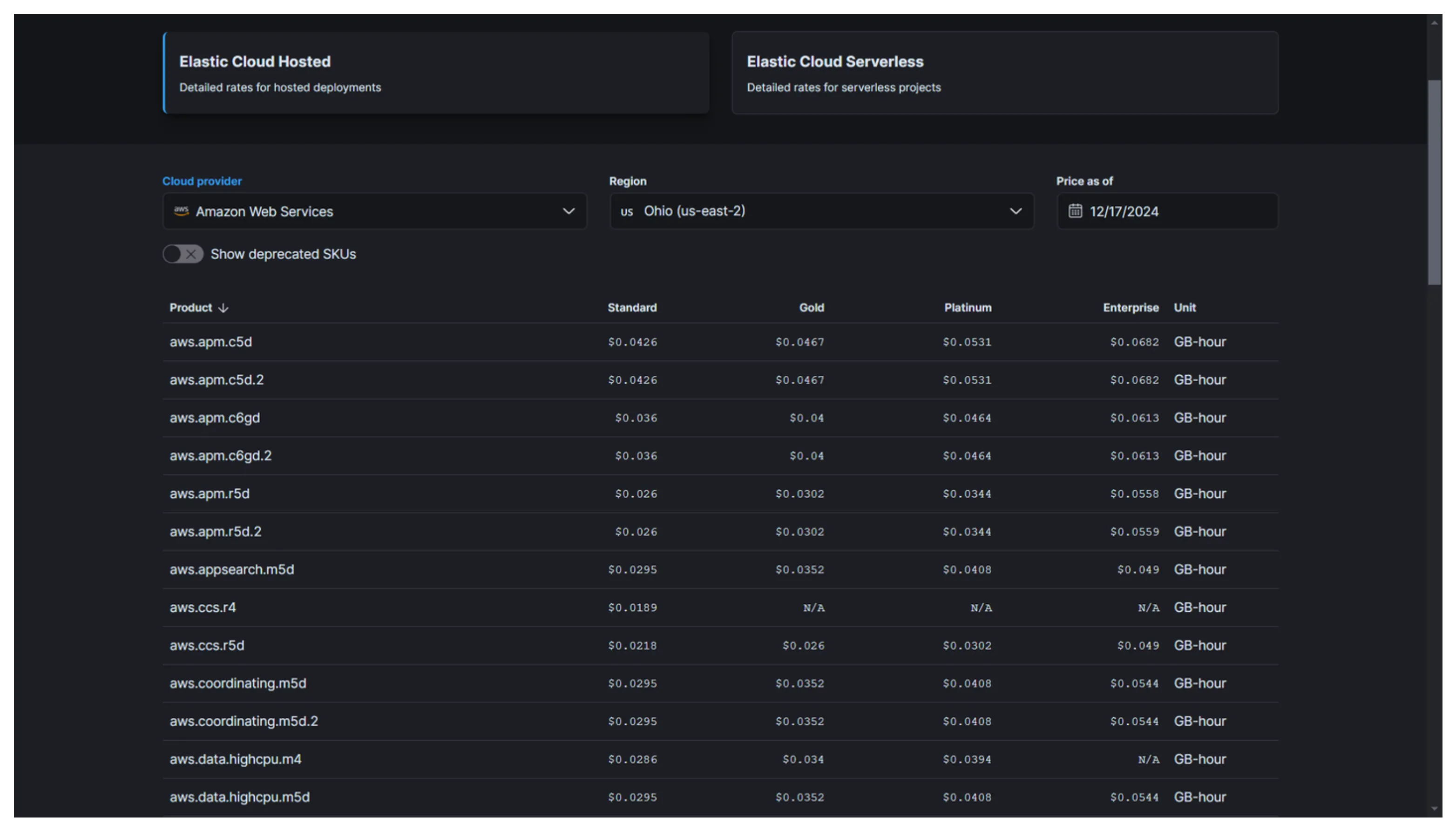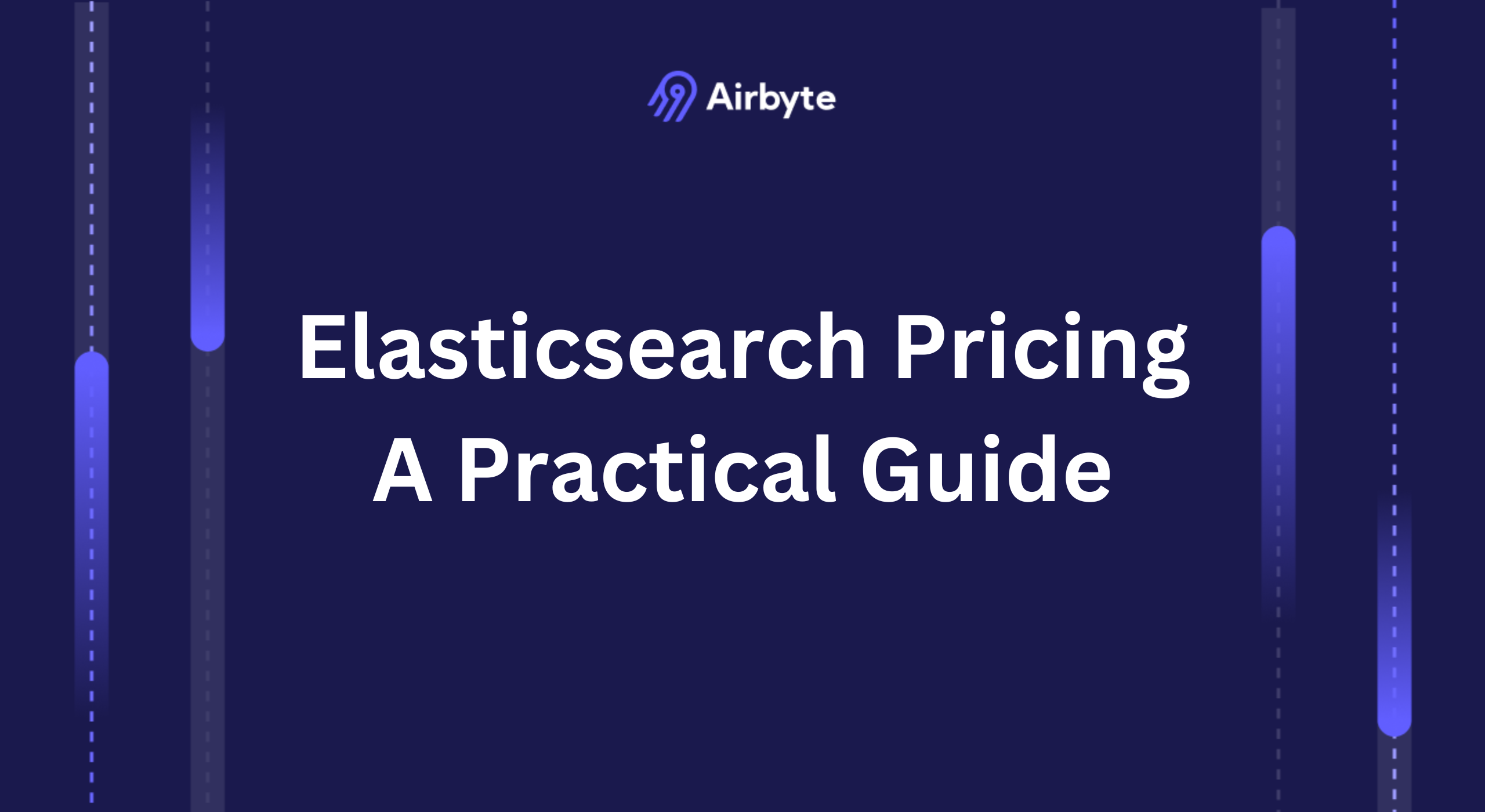Elasticsearch Pricing: A Practical Guide to Costs & Performance
Summarize this article with:
✨ AI Generated Summary
Elasticsearch offers tiered pricing for Elastic Cloud ranging from $95 to $175+ per month, with increasing features like advanced security, machine learning, and AI insights. Pricing models include subscription tiers, consumption-based Elastic Consumption Units (ECUs), and serverless options, balancing cost predictability and scalability.
- Key cost drivers: compute resources, storage tiers (hot, warm, cold, frozen), and data transfer fees.
- Self-managed options provide control but add infrastructure and operational costs.
- Recent performance improvements and data compression reduce resource needs and storage costs.
- Cost optimization strategies include right-sizing clusters, index lifecycle management, query optimization, and data tiering.
- Airbyte integration enhances cost efficiency by incremental syncing, data transformation, and filtering to reduce storage and improve query performance.
Elasticsearch offers flexible pricing models designed to accommodate different deployment scenarios and organizational needs. This comprehensive guide covers all aspects of Elasticsearch pricing—from cloud-based solutions to self-managed deployments—helping database engineers and organizations make informed decisions about their Elasticsearch implementation.
What Are the Available Elastic Pricing Models?
Elastic Cloud
Elastic Cloud is a fully managed Elasticsearch service available on AWS, Azure, and Google Cloud. Pricing is tiered by feature set and support level.
Standard Tier
Starting at $95 / month
Basic security features form the foundation of this tier. You get discovery and field statistics capabilities along with Kibana Lens visualization tools.
The package includes Elastic Maps and Canvas for visual data representation. Basic alerting and in-stack actions help monitor your deployment effectively.
Detection engine functionality comes with centralized ingest management. Host data collection works alongside basic case management features.
Cloud security posture management (CSPM) provides additional security oversight for your infrastructure.
Gold Tier
Starting at $109 / month — includes everything in Standard plus:
Advanced reporting capabilities extend beyond basic functionality. Watcher alerting provides sophisticated monitoring options for complex deployments.
Multi-stack monitoring enables oversight across multiple Elasticsearch clusters. Enhanced security workflows streamline incident response procedures.
Third-party incident-response integration connects with existing security tools. Advanced detection alert notifications provide detailed threat information.
Extended host-management configuration offers greater control over your infrastructure. Business-hours support covers phone and web channels for 6 contacts with response times ranging from 4 business hours for urgent issues to 2 business days for normal requests.
Platinum Tier
Starting at $125 / month — includes everything in Gold plus:
Advanced Elastic Stack security capabilities protect sensitive data across deployments. Machine learning features enable automated pattern detection and anomaly identification.
Cross-cluster replication ensures data availability across geographic regions. Advanced SIEM functionality provides comprehensive security information and event management.
Ransomware protection safeguards against evolving threats. Observability enhancements include log categorization, service maps, and service level objectives (SLOs).
Search enhancements deliver semantic search capabilities and hybrid ranking algorithms. Document-level security controls access at granular levels.
Support coverage extends to 24x7x365 availability for 8 contacts. Response times range from 1 hour for urgent issues to 1 business day for normal requests.
Enterprise Tier
Starting at $175 / month — includes everything in Platinum plus:
Searchable snapshots enable cost-effective long-term storage strategies. Cold and frozen storage tiers optimize costs for infrequently accessed data.
Elastic Maps Server provides advanced geographic visualization capabilities. Long-retention archives support extended data preservation requirements.
Host response actions enable automated threat mitigation. Cloud workload protection secures containerized and cloud-native applications.
AI-powered insights deliver predictive analytics and automated recommendations. Premium support includes dedicated technical account managers and custom service level agreements.
How Does Elastic Consumption Unit Pricing Work?
Elastic introduced a consumption-based pricing model centered around Elastic Consumption Units (ECUs). One ECU equals $1.00 and consolidates costs for capacity measured in GB-hour, data transfer in GB, and snapshot storage including GB-month storage and snapshot API requests.
Organizations pre-purchase ECUs for single-year or multi-year terms. Monthly usage gets deducted from the ECU balance automatically.
Any overage beyond your ECU balance reverts to on-demand list pricing. This model provides cost predictability while accommodating usage spikes.
Elastic Cloud Serverless Pricing
For Elastic Cloud Serverless, pricing operates on refined principles. Security and Observability services price based on data ingestion volumes and retention periods.
Elasticsearch services use Virtual Compute Units (VCUs) for compute resource pricing. Automatic scaling optimizes both performance and costs for variable workloads.
What Are the Key Components of Elastic Pricing Breakdown?
Compute Resources
Storage Costs
Storage pricing varies across multiple tiers designed for different access patterns.
- Hot tier provides immediate access for frequently queried data.
- Warm tier offers cost savings for data accessed less frequently.
- Cold tier provides further cost reduction for infrequently accessed historical data.
- Frozen tier delivers the lowest storage costs for archival data requiring occasional access. Pricing depends on both volume and retention period including standard, extended, and custom options.
Data Transfer Costs
- Ingress traffic generally remains free although cloud provider limits may apply.
- Egress pricing applies to several transfer scenarios.
Zone-to-zone transfers within the same region incur minimal charges. Region-to-region transfers across different geographic locations cost more.
External network transfers and transfers to other cloud providers typically carry the highest charges. Understanding these patterns helps optimize data architecture and reduce transfer costs.
What Are the Self-Managed Elasticsearch Pricing Options?
Basic Edition
Free to download and use

Core Elasticsearch functionality provides essential search and analytics capabilities. Basic security features protect your data with standard authentication and authorization.
Standard APIs enable integration with existing applications and workflows. Community support connects you with other users and documentation resources.
Enterprise Edition
Custom pricing

Advanced security features protect sensitive data across complex deployments. Machine learning capabilities enable sophisticated analytics and pattern detection.
Cross-cluster replication ensures high availability across geographic regions. Monitoring tools provide comprehensive visibility into cluster health and performance.
Enterprise support agreements deliver dedicated assistance with custom service level agreements. Self-managed deployments provide complete infrastructure control but require organizations to account for hardware, operations, and maintenance in total cost of ownership calculations.
How Do Recent Performance Improvements Impact Elasticsearch Costs?
Query Performance Enhancements
Query parallelization delivers substantial latency improvements on most queries and aggregations. However, this optimization does not necessarily reduce compute resource consumption for equivalent workloads, and may in some cases increase it.
Better resource utilization means you can handle more queries with existing infrastructure. The performance gains translate directly to cost savings through improved efficiency.
Vector Search Optimizations
Scalar quantization converts float32 vectors to int8 format reducing storage requirements significantly. This compression technique maintains search accuracy while lowering storage costs.
Better Binary Quantization (BBQ) in version 8.16 reduces RAM requirements substantially while maintaining high recall rates. These optimizations enable larger datasets within existing memory constraints.
Storage Compression Improvements
LogsDB index mode cuts log storage footprint through advanced compression techniques. ZSTD, delta, and run-length encoding work together to achieve substantial space savings.
Searchable snapshots enable storing more data at identical cost by tiering to low-cost object storage. This approach provides cost-effective long-term data retention without sacrificing accessibility.
What Are the Most Effective Cost Optimization Strategies?
Resource Optimization
Right-sizing clusters prevents over-provisioning and reduces unnecessary costs. Choose appropriate instance types that match your workload characteristics and performance requirements.
Implement index lifecycle management (ILM) to automate data transitions across storage tiers. Smart shard allocation distributes data efficiently across cluster nodes.
Monitor resource utilization continuously to identify optimization opportunities. Adjust cluster configurations based on actual usage patterns rather than peak theoretical requirements.
Storage Optimization
Data tiering moves older data to cost-effective storage tiers automatically. Compression reduces storage footprint, but can slightly impact search and indexing performance depending on the compression algorithm and workload.
Snapshots provide cost-effective backup and archival solutions. Lifecycle policies automate data management tasks and ensure consistent cost optimization.
Regular cleanup of unnecessary indices and documents prevents storage bloat. Monitor storage growth patterns to predict and plan for capacity requirements.
Network Transfer Optimization
Optimize queries to reduce data transfer between nodes and clients. Implement caching strategies to minimize repeated data retrieval operations.
Bulk operations reduce network overhead compared to individual requests. Smart routing directs queries to appropriate nodes reducing cross-cluster communication.
Consider data locality when designing index strategies. Place frequently accessed data closer to compute resources to minimize transfer costs.
Advanced Data Lifecycle Management
Sophisticated ILM policies significantly reduce storage expenses while maintaining required performance levels. Automated transitions between storage tiers optimize costs based on data age and access patterns.
Custom retention policies ensure you keep only necessary data. Regular policy reviews and adjustments maintain optimal cost-performance balance.
Query and Index Optimization
Remove unnecessary fields and analyzers to reduce index size and improve performance. Streamline queries to lower compute resource consumption.
Monitor slow queries to identify optimization opportunities. Well-designed indices improve query performance while reducing resource requirements.
How Does Airbyte Help Optimize Elasticsearch Query Costs?
Airbyte's incremental syncing capabilities significantly reduce Elasticsearch storage requirements and indexing expenses. The platform eliminates the need for custom ETL engineering while maintaining data freshness and accuracy.
Transformation features optimize data structure before ingestion into Elasticsearch. This preprocessing reduces storage costs and improves query performance without requiring manual data preparation.
Filtering capabilities ensure only relevant data reaches your Elasticsearch cluster. This selective approach minimizes storage costs and improves query performance by reducing dataset size.
With over 600 connectors, Airbyte streamlines data integration from multiple sources into Elasticsearch. This comprehensive connectivity eliminates the complexity and cost of maintaining multiple integration tools.
Conclusion
Understanding Elastic's pricing tiers and the variables influencing compute, storage, and data-transfer costs enables organizations to design deployments that balance performance with budget. Consumption-based ECUs and serverless options provide additional avenues to lower total cost of ownership. Recent performance improvements deliver substantial cost savings through better resource utilization and storage efficiency. Combining these best practices with Airbyte's efficient data-movement features can drive significant cost reductions while maintaining cluster performance and flexibility.
Frequently Asked Questions
What is the difference between Elastic Cloud pricing and self-managed Elasticsearch costs?
Elastic Cloud offers predictable monthly pricing starting at $95 with hosting, support, and automatic updates included. Self-managed deployments may lower software costs but add infrastructure and operational overhead that must be factored into total cost calculations.
How do Elastic Consumption Units (ECUs) affect my billing?
ECUs equate $1.00 per unit and unify billing for capacity, data transfer, and snapshot storage, providing predictable costs versus per-agent or per-connector models. Organizations pre-purchase ECUs and monthly usage gets deducted from the balance.
What are the main cost drivers in Elasticsearch deployments?
Compute resources, storage tiering, data-transfer charges, and operational overhead represent the primary cost drivers. Storage often dominates long-term spending especially for data-intensive applications with extended retention requirements.
How can I reduce my Elasticsearch storage costs?
Leverage index lifecycle management (ILM), searchable snapshots, compression techniques, deduplication, and well-defined retention policies to achieve substantial storage cost savings. These strategies work together to optimize storage utilization without impacting performance.
Is Elasticsearch pricing competitive compared to alternatives?
Elasticsearch excels in search-intensive use cases where its advanced search capabilities justify the investment. For pure analytics workloads other platforms may offer better price-performance ratios, so evaluate your specific requirements carefully before making decisions.

.webp)
